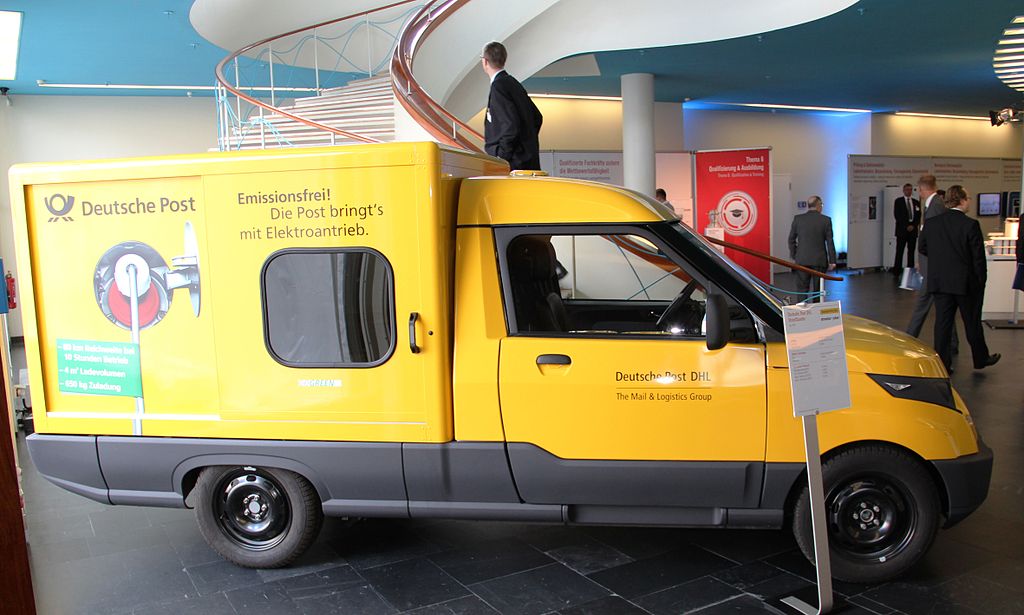Car industry is clearly not a core business of the German post office. However, trucks are one of the most important assets of any logistics company. Car fleet of German mail giant Deutsche Post, which also owns international express delivery service DHL, has about 70 thousand commercial vehicles in Germany alone.
Every day they get piles of work because the online trade is growing rapidly, and so does number of parcels delivered to customers. With a goal to save on gasoline and contribute to protection of the global climate, the company has decided to convert their vehicles to electric traction. However, the project’s volumes were relatively small so big carmakers didn’t find it interesting. Then, the German post office decided to take up development of electric vehicles on its own.
Serial production of electric post vehicles began in spring 2016 with just 1,000th copies officially put into operation. By the end of this year, Deutsche Post intends to increase number of light commercial electric vehicles up to 2000. Already in 2017, production of a former car-building factory in Aachen should reach 10 000 units per year.
These electric vehicles, called StreetScooter, are produced by a firm of the same name, a typical startup. It was nurtured in depths of the Rhine-Westphalian Technical High School in Aachen (RWTH).
Deutsche Post Concern first became a co-investor in the project, and bought out StreetScooter in 2014. By this time, the small startup developed a model of commercial electric vehicle called Work, a functional, roomy, not burdened with gadgets and design refinements, inexpensive thing. Its length of run ranges from 50 to 80 kilometers, maximum speed - 80 kilometers per hour. The car can transport 4 cubic meters of correspondence, the lithium-ion battery, adapted to the regime of constant stops, carges in 4.5-7 hours.
Seeing ecological character of the project, the Ministry of Environment of Germany decided to support it. The government body provided 9.5 million euros - a third of the R&D budget for 2016-2018. StreetScooter’s to climate protection is that each car replaces an old one with internal combustion engine, that burns to 1100 liters of diesel a year and pollutes the atmosphere. Tens of thousands of such cars can make a big difference, not to mention fuel savings for Deutsche Post.
source: dw.de
Every day they get piles of work because the online trade is growing rapidly, and so does number of parcels delivered to customers. With a goal to save on gasoline and contribute to protection of the global climate, the company has decided to convert their vehicles to electric traction. However, the project’s volumes were relatively small so big carmakers didn’t find it interesting. Then, the German post office decided to take up development of electric vehicles on its own.
Serial production of electric post vehicles began in spring 2016 with just 1,000th copies officially put into operation. By the end of this year, Deutsche Post intends to increase number of light commercial electric vehicles up to 2000. Already in 2017, production of a former car-building factory in Aachen should reach 10 000 units per year.
These electric vehicles, called StreetScooter, are produced by a firm of the same name, a typical startup. It was nurtured in depths of the Rhine-Westphalian Technical High School in Aachen (RWTH).
Deutsche Post Concern first became a co-investor in the project, and bought out StreetScooter in 2014. By this time, the small startup developed a model of commercial electric vehicle called Work, a functional, roomy, not burdened with gadgets and design refinements, inexpensive thing. Its length of run ranges from 50 to 80 kilometers, maximum speed - 80 kilometers per hour. The car can transport 4 cubic meters of correspondence, the lithium-ion battery, adapted to the regime of constant stops, carges in 4.5-7 hours.
Seeing ecological character of the project, the Ministry of Environment of Germany decided to support it. The government body provided 9.5 million euros - a third of the R&D budget for 2016-2018. StreetScooter’s to climate protection is that each car replaces an old one with internal combustion engine, that burns to 1100 liters of diesel a year and pollutes the atmosphere. Tens of thousands of such cars can make a big difference, not to mention fuel savings for Deutsche Post.
source: dw.de





